Sewage Pump Truck: An In-Depth Guide

Sewage pump trucks play a crucial role in maintaining sanitation in urban, suburban, and rural areas. These essential vehicles are designed to transport and manage wastewater and sewage, ensuring that the environment remains clean and safe. This comprehensive guide covers everything you need to know about sewage pump trucks, including their design, operation, maintenance, and more.
What is a Sewage Pump Truck?
A sewage pump truck, also known as a vacuum truck or septic truck, is a specialized vehicle equipped with a vacuum system that extracts and transports liquid waste. They are commonly used in various industries, including municipal services, construction, and even agriculture. Their efficient design allows for the quick and safe removal of sewage and wastewater from homes, businesses, and public facilities.
How Do Sewage Pump Trucks Work?
The Components of a Sewage Pump Truck
A sewage pump truck comprises several critical components that enable it to function effectively. Understanding these parts can help in appreciating how the truck works.
- Vacuum Pump: The heart of the sewage pump truck, the vacuum pump creates a vacuum that pulls waste into the tank.
- Tank: This is where the collected sewage is stored. Tanks come in various sizes, typically ranging from 1,000 to 3,000 gallons.
- Hose and Nozzle: These are used to connect the truck to the sewage source for extraction. The nozzle is often specially designed to facilitate efficient pumping.
- Controls: These are located in the cab and allow the driver to manage the vacuum and tank functions easily.
Operation Process
The operation of a sewage pump truck involves several steps:
- Preparation: The operator checks the truck’s components, including the vacuum system and tank integrity.
- Connection: The operator connects the hose to the sewage source, ensuring a tight seal.
- Pumping: The operator activates the vacuum pump, which begins drawing the sewage into the tank.
- Transport: Once the tank is full, the truck transports the sewage to an approved disposal site.
- Disposal: At the disposal site, the operator safely releases the waste into the treatment facility.
Types of Sewage Pump Trucks
There are various types of sewage pump trucks tailored for specific applications:
Vacuum Trucks

These trucks utilize powerful vacuum systems for efficient liquid waste extraction. They are commonly used in municipalities and industrial sites.
Septic Trucks
These trucks are specifically designed to pump out septic tanks. They often have specialized tanks and hoses to fit residential septic systems.
Combination Trucks
Combination trucks can simultaneously vacuum and pressure-wash surfaces, making them suitable for heavier industrial applications.
Portable Pump Trucks
These smaller versions are often used for temporary applications such as events or construction sites where portable sanitation is required.
Choosing the Right Sewage Pump Truck
Selecting the appropriate sewage pump truck depends on several factors:
1. Size and Capacity
Consider the volume of waste you typically need to transport. Larger trucks are suitable for industrial applications, while smaller ones serve residential clients.
2. Intended Use
Determine whether the truck will primarily handle sewage, industrial waste, or a combination. This will influence the features needed in the truck.
3. Regulatory Compliance
Ensure that the truck meets local regulations regarding waste disposal and environmental standards.
4. Budget
Costs can vary significantly based on size, brand, and features. Determine your budget beforehand and assess the options within your price range.
Maintenance of Sewage Pump Trucks
Regular maintenance is necessary to keep sewage pump trucks running efficiently. Here’s what you need to know:
Daily Checklists
- Inspect hoses for wear and tear.
- Check fluid levels in the vacuum pump and other systems.
- Ensure all connections are tight and secure.
Periodic Maintenance
Routine maintenance tasks include:
- Flushing the tank and hoses to eliminate residue buildup.
- Changing engine oil and filters according to manufacturer recommendations.
- Inspections of the vacuum pump for performance and leaks.
Troubleshooting Common Issues
Common issues with sewage pump trucks may include:
- Poor suction: Often caused by blockages in hoses or damage to the vacuum system.
- Leaks: Check seals and hoses for integrity.
- Engine issues: Regularly maintain the engine to avoid performance degradation.

Real-World Applications of Sewage Pump Trucks
Sewage pump trucks are versatile and used across multiple sectors. Here are practical examples:
Municipal Wastewater Management
Cities and towns use sewage pump trucks to maintain sewage systems, especially during emergencies or overflows.
Construction Sites
In construction, these trucks are essential for managing wastewater from portable toilets and temporary facilities.
Agricultural Use

Farmers may use sewage trucks to transport manure or process agricultural waste effectively.
Environmental Impact and Regulations
Operating sewage pump trucks involves adhering to environmental regulations, ensuring that waste is disposed of safely.
Compliance with Local Laws
Operators must understand and comply with local laws regarding waste transport and treatment.
Environmental Considerations
Improper management of sewage can lead to severe environmental impacts, including water contamination and health hazards. Proper training and procedures are essential for all personnel involved in waste management.
Frequently Asked Questions (FAQs)
What types of waste can sewage pump trucks handle?
Sewage pump trucks can handle various liquid wastes, including sewage, industrial waste, and agricultural runoff, depending on their configurations.
How often should sewage pump trucks be serviced?
Routine maintenance is performed daily; however, more in-depth inspections and services are typically scheduled every six months or as recommended by the manufacturer.
Can sewage pump trucks operate in adverse weather conditions?
Yes, sewage pump trucks are designed to operate in various weather conditions, but operators must exercise caution during extreme weather to ensure safety.
How do I learn to operate a sewage pump truck?
Training programs are available through vocational schools or specialized companies. Operators should also receive on-the-job training.
What should be done in case of a sewage spill?
In case of a spill, follow local emergency protocols, contain the spill, and notify the appropriate waste management authorities immediately.
What are the signs of a malfunctioning sewage pump truck?
Signs of malfunction can include poor suction, unusual noises from the vacuum pump, leaks, and warning lights on the control panel. Regular inspections can help catch potential issues early.
